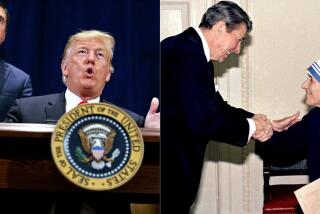4 o’Clock Shadows
President Reagan’s style is standing tall, forging ahead, thinking positively and presiding over a show where seldom is heard a discouraging word.
So you can imagine the shock that rippled through the business community after a speech last week by Richard G. Darman, deputy Treasury secretary, who said, among other things: There is a tendency “in large-scale corporate America . . . to be like the government bureaucracy that corporate executives love to malign: bloated, risk-averse, inefficient and unimaginative.”
Darman’s basic message was that federal tax reform was a step in the right direction but that something else was needed to cure what ails the American economy. To prosper in the long run, the United States must invest more in research and development, he said, and shed its parochialism so that it can know the market in industrial nations like Japan and South Korea as well as it knows the market in America.
But even to discuss such matters “with some of America’s corporate leaders,” he said, “it is often best to call after 10 in the morning and before 4 in the afternoon--unless one has the number of their car phones.”
Darman did not break any new ground with the speech. Management analysts have worried for years that too many American managers are too complacent, too preoccupied with short-term profits to the exclusion of the longer, larger picture. Nor is there any argument that something is wrong. America is now a debtor nation, an agricultural giant that imports more food than it exports, running trade deficits that are exceeded only by its federal budget deficits. It remains prosperous, but average family income has been almost flat in the past decade. But such criticism was generally identified with liberal economists and maverick businessmen, not with the Reagan team.
Some corporate executives were quick to deny that the shoe fit them, and Darman left himself the obvious out by saying that the criticism applied only to “some” of America’s tycoons.
Darman had no formula for correcting the flaws that he saw in the American “corpocracy.” Few other critics do, either. But simply having a ranking member of the Reagan Administration raise such questions may intensify the search for answers among corporate leaders whom he has trouble reaching on the telephone after 4 o’clock.If so, the shock will have been worth it.
More to Read
Inside the business of entertainment
The Wide Shot brings you news, analysis and insights on everything from streaming wars to production — and what it all means for the future.
You may occasionally receive promotional content from the Los Angeles Times.










